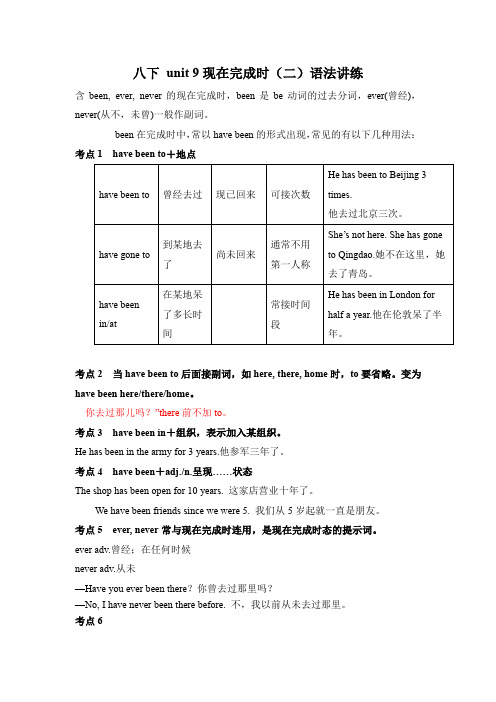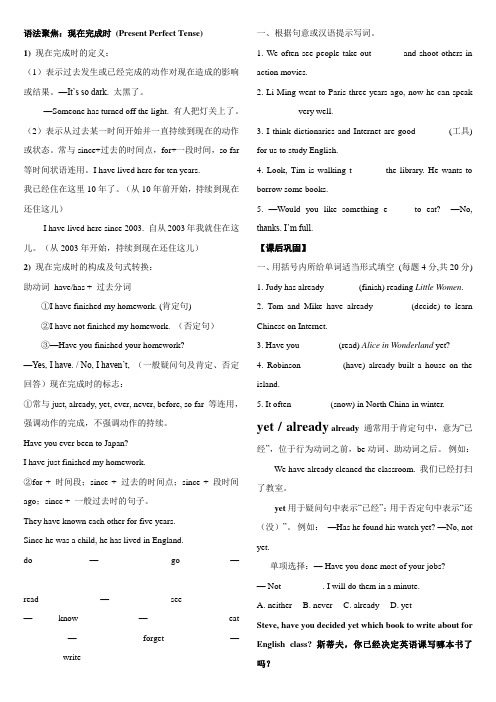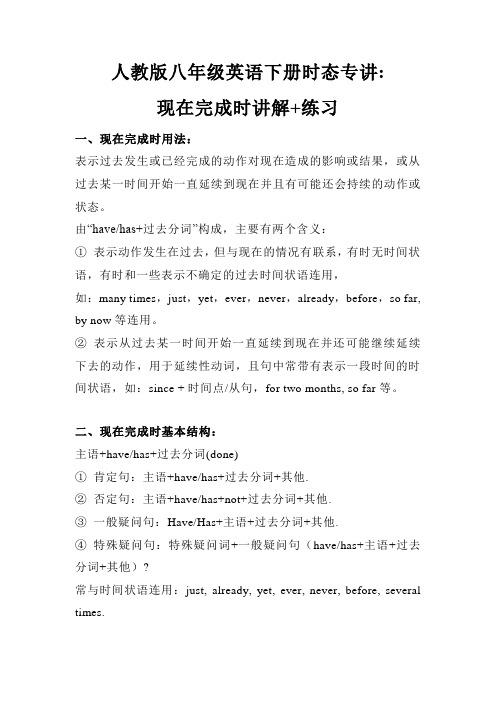人教版八年级英语下册现在完成时讲解及练习
八年级英语下册现在完成时及现在完成进行时讲解及练习人教新目标

八年级英语下册现在完成时及现在完成进行时讲解及练习人教新目标八年级英语下册现在完成时及现在完成进行时讲解及练习人教新目标一.现在完成时的构成:现在完成时由助动词have(has)+动词的过去分词构成。
has用于第三人称单数,have用于其他各种人称.二.现在完成时的用法:其用法主要有三种I.“已完成”用法:表示一个过去发生并结束的动作对现在造成的影响或结果。
这一类情况可以细致分为下述两种情况。
1)表示开始于过去的动作刚刚结束。
常和just,now,already,yet,not…yet等不确定的时间状语连用。
Li Ming has just turned off the light. 李明刚刚把灯关上。
(说明现在灯关上了)I've finished my homework now. 现在我已经做完作业了。
(说明可以交作业或做别的了)2)表示过去动作的结果,现在仍残留着。
一般不用时间状语。
I have lost my pen. 我把笔丢了。
(说明过去某时丢的,现在我还没找到这支笔)She has become a teacher. 她已经当了老师。
(说明她现在仍是老师)II.“未完成”用法。
表示动作或状态从过去某时开始,持续到现在,可能继续下去,也可能刚刚结束。
常和表示一段时间的状语连用。
如today,this week(month),lately,recently,these days,in the past few days,during the last two weeks,since,since yesterday,since 2 days ago,since 1991,for a long time,for a month,so far,up to now,till(until) now等。
He has lived here for 30 years. 他住在这儿三十年了。
(现在还住在这儿)They've known each other since childhood. 他们从小彼此相识。
人教版八年级英语下册Unit 10 现在完成时精讲精练

八下unit 10 现在完成时精讲精练表示从过去已经开始持续到现在的动作或状态,可以和表示“从过去某一时刻延续到现在的一段时间状语”连用,如“for + 时间段”、“since + 过去时间点”、“since + 过去时的从句”、“since + 一段时间+ ago”。
且for与since引导的时间状语可以相互转换。
一、含since 或for 的现在完成时某些动词的现在完成时可表示过去某一时间开始并一直持续到现在的动作或状态,常与“for + 时间段”、“ since+过去的时间点或从句”或“since + 时间段+ago”连用。
He has worked here for over twenty years.He has learned about 5,000 English words since he went to college.She’s been at this school since five years ago.二、现在完成时中的谓语动词在现在完成时中,与“for + 时间段”、“since + 过去的时间点或从句”或“since+时间段+ago”连用的动词必须为延续性动词。
常见的延续性动词有have,live,teach,learn,work,study ,know 等;常见的非延续性动词(词组)有come,go,leave,start,die,finish,become,join,buy,get married 等。
1. 转换为相应的延续性动词,用于现在完成时。
borrow — keep buy — have put on — wearcatch a cold — have a cold get to know — knowget to sleep — sleep2. 转化为“be + 形容词/副词/介词/名词”begin / start — be on go out — be out close — be closedopen — be open get to/arrive/reach — be (in)die — be dead leave — be away finish — be overfall sleep — be asleep join — be in/be a member ofbecome — be make friends — be friendscome/go — be + 相应的介词短语达标检测一.单项选择。
人教版英语八年级下册 Unit 9 现在完成时讲解及练习

八下unit 9现在完成时(二)语法讲练含been, ever, never的现在完成时,been是be动词的过去分词,ever(曾经),never(从不,未曾)一般作副词。
been在完成时中,常以have been的形式出现,常见的有以下几种用法:考点1 have been to+地点考点2 当have been to后面接副词,如here, there, home时,to要省略。
变为have been here/there/home。
你去过那儿吗?”there前不加to。
考点3 have been in+组织,表示加入某组织。
He has been in the army for 3 years.他参军三年了。
考点4 have been+adj./n.呈现……状态The shop has been open for 10 years. 这家店营业十年了。
We have been friends since we were 5. 我们从5岁起就一直是朋友。
考点5 ever, never常与现在完成时连用,是现在完成时态的提示词。
ever adv.曾经;在任何时候never adv.从未—Have you ever been there?你曾去过那里吗?—No, I have never been there before. 不,我以前从未去过那里。
考点6表示过去已经开始,持续到现在的动作或状态。
此时常与“for+一段时间”或“since+过去的点时间或从句(从句用一般过去时)”以及so far(到目前为止)等时间状语连用。
I’ve lived here since 2000.自从2000年我就住在这里。
=I’ve lived here since 13 years ago.=I’ve lived here for 13 years.=It is 13 years since I began to live here.注意:①在这类句子的肯定句和疑问句中谓语动词必须用延续性动词。
新人教版英语八年级下册unit8重点讲解和练习题(无答案)

语法聚焦:现在完成时(Present Perfect Tense)1) 现在完成时的定义:(1)表示过去发生或已经完成的动作对现在造成的影响或结果。
—It’s so dark. 太黑了。
—Someone has turned off the light. 有人把灯关上了。
(2)表示从过去某一时间开始并一直持续到现在的动作或状态。
常与since+过去的时间点,for+一段时间,so far 等时间状语连用。
I have lived here for ten years.我已经住在这里10年了。
(从10年前开始,持续到现在还住这儿)I have lived here since 2003. 自从2003年我就住在这儿。
(从2003年开始,持续到现在还住这儿)2) 现在完成时的构成及句式转换:助动词have/has + 过去分词①I have finished my homework. (肯定句)②I have not finished my homework. (否定句)③—Have you finished your homework?—Yes, I have. / No, I haven’t, (一般疑问句及肯定、否定回答)现在完成时的标志:①常与just, already, yet, ever, never, before, so far 等连用,强调动作的完成,不强调动作的持续。
Have you ever been to Japan?I have just finished my homework.②for + 时间段;since + 过去的时间点;since + 段时间ago;since + 一般过去时的句子。
They have known each other for five years.Since he was a child, he has lived in England.do __________ —____________ go__________ —___________read ______ —______ see _________ —______know____________ —_____________ eat _______ —_________ forget _________ —_________write________-______ 一、根据句意或汉语提示写词。
人教版八年级英语下册时态专讲-现在完成时讲解+练习

人教版八年级英语下册时态专讲:现在完成时讲解+练习一、现在完成时用法:表示过去发生或已经完成的动作对现在造成的影响或结果,或从过去某一时间开始一直延续到现在并且有可能还会持续的动作或状态。
由“have/has+过去分词”构成,主要有两个含义:①表示动作发生在过去,但与现在的情况有联系,有时无时间状语,有时和一些表示不确定的过去时间状语连用,如:many times,just,yet,ever,never,already,before,so far, by now等连用。
②表示从过去某一时间开始一直延续到现在并还可能继续延续下去的动作,用于延续性动词,且句中常带有表示一段时间的时间状语,如:since + 时间点/从句,for two months, so far等。
二、现在完成时基本结构:主语+have/has+过去分词(done)①肯定句:主语+have/has+过去分词+其他.②否定句:主语+have/has+not+过去分词+其他.③一般疑问句:Have/Has+主语+过去分词+其他.④特殊疑问句:特殊疑问词+一般疑问句(have/has+主语+过去分词+其他)?常与时间状语连用:just, already, yet, ever, never, before, several times.Already: “已经”; yet“仍然, 还”,这两个副词常常用于完成时态, 其中already常用于肯定句, yet常用于否定句和疑问句中。
如: Jim has already finished his work. Jim已经把他的工作做完了。
Mother hasn’t come home yet. 妈妈还没回来。
三、现在完成时一般过去时的区别:现在完成时表示的是与现在有关联的过去事件;而一般过去时则与现在毫无关系,只是单纯的过去的情况。
比较:I have lost my pen, so I have to buy one.我丢了钢笔,所以得去买一枝。
初二下册人教版完整版英语现在完成时 及解析

初二下册人教版完整版英语现在完成时及解析一、选择题1.―Olivia, are you sure your aunt ________back from America?―Yes. My mom told me. I'm going to see her now.A.had come B.came C.is coming D.has come 2.Gina can’t go to the farm with her classmates because she________ a bad cold.A.is caught B.is catching C.will catch D.has caught 3.— I remember that Mr.Green once traveled broad.— Not only Mr.Green but also his daughters ______ abroad twice.A.have gone B.have been C.has gone D.has been 4.— When did the Mixc Shopping Center open? — It ________ for nearly half a year. A.has opened B.has been open C.was opened D.had been open 5.—May I borrow your new-bought book The Adventures of Tom Sawyer now?—I'm afraid not. I ________ only half of it, and I'll try to finish it this weekend.A.read B.am reading C.have read D.will read 6.It is 4:30p. m. Ben and Leon _______their work, so they are playing chess now. A.finish B.were finishing C.have finished D.will finish 7.—Is that man George?—It can’t be him. After all he ________ this place fo r years!A.has left B.has been away from C.was away from D.left8.You are too late. The film for half an hour.A.ends B.ended C.has ended D.has been over 9.—When did you buy your car? It looks so new.—Really? I ________ it for three years and I like it very much.A.have bought B.have had C.bought D.had 10.Lisa ________ her homework yet. I am afraid she can't go to the park with you. A.didn't finish B.hasn't finished C.wasn't finishing D.won't finish 11.— When will your sister go to England?— She _________ London since four months ago.A.went to B.has gone to C.has been to D.has been in 12.—Mum, I want to watch the news about our school. Change the channel, please!—What a pity! It is eight o'clock now. It___________ for a while.A.has been over B.was over C.has finished D.finished 13.— Would you like to see the film The Wondering Earth with me?—I’m sorry I __________it twice.A.see B.have seen C.am seeing D.saw 14.—Sorry, I’m late. There’s too much traffic on the road.—It doesn’t matter. The film has just_______for five minutes.A.begun B.finished C.been on D.been over 15.Mary said that she________ to Yangzhou.A.has never gone B.had never gone C.has never been D.had never been 16.For nearly 100 years, the heartbroken Little Mermaid ________on a rock looking out over Copenhagen's port.A.will sit B.sits C.sat D.has sat17.I think my father knows everything. He is my hero, he________ over 2500 books. A.reads B.read C.is reading D.has read 18.—Why don’t you go to bed, Jimmy?— Mum promised to tell me a bedtime story, but she ______ her work.A.doesn’t finish B.didn’t finish C.hasn’t finished D.won’t finish 19.My mother is a teacher. She ________ English in our school since she graduated from university.A.taught B.has taught C.is teaching D.will teach 20.—Oh, your spoken English is very good, Linda.—Thank you. I _____________in England for three years.A.have studied B.studied C.was studying D.study 21.—Look! The man looks like Mr. Li.—It can’t be him. Because he with his families________Japan since last Thursday and they haven’t returned.A.has gone to B.has been to C.have been in D.has been in 22.—Have you been to the Robot Restaurant in our city?—No. Although it _________ for more than a year, I’m far too busy to go there.A.has started B.has been on C.has been open D.has opened 23.Hurry up! The concert ______ for ten minutes.A.has begun B.has been on C.has gone D.has finished 24.Since Tencent released Wechat, it ________ one of the most popular apps in the world. A.became B.has become C.has been D.was25.Both his parents look sad. Maybe they _________ what's happened to him.A.will know B.know C.have known D.are knowing 26.Neither Mark nor his parents ________ Sanya before, so they can’t wait to start the journey. A.have gone to B.have been to C.has gone to D.has been to 27.—Where are the doctors now?—In the meeting room. They ________ the meeting for 10 minutes.A.have begun B.have been on C.have had D.have been held28.So far, China ________ the world’s largest highway network, with a total le ngth of 160,000 kilometers.A.builds B.built C.will build D.has built 29.—Would you like to watch the film Fast and Furious 9 tonight?— Sure. I still want to see it again although I ________ it already.A.watch B.will watch C.was watching D.have watched 30.Mr. Wu ________ Germany since three years ago, so he knows a lot about the Germanculture and customs.A.has gone to B.went to C.has been to D.has been in 31.—Bill Gates and Melinda Gates, two of the world’s richest people, said “we no longer believe we can grow together as a couple”.—I am so sorry to hear that because they ________ for nearly 30 years.A.have been married B.have got married C.have got married to D.have been married with32.— Where is Jim?— He ________ Beijing on business for a week. H e’ll be back tomorrow.A.has come to B.has gone to C.has been to D.has been in 33.—When will the live women’s football match between China and South Korea begin on TV?—Oh, it ________ for ten minutes, ending in 4:3. China won the game.A.has finished B.has been on C.has been over D.has begun 34.—Where is your uncle? —In the USA.He ________ there for two months.A.has gone B.has gone to C.has been D.has been to 35.Online learning ________ very popular with students since last year.A.has become B.are becoming C.would become D.had become 36.—Have you ever worked in Nanjing?—Yes. I ________ in Nanjing since three years ago.A.would work B.worked C.was working D.have worked 37.—What do you think of the latest 5G smart phone?— It's amazing. It is the most wonderful phone I ________.A.used B.will use C.was using D.have used 38.—John, you ________ the Slender West Lake before, right?—Sure, lot of times. Are you thinking of taking a trip there?A.have gone to B.have come to C.have been to D.have been in 39.—Sorr y, I’m late. Has the meeting begun?—It doesn’t matter. The meeting ________ for several minutes.A.has just begun B.has just been overC.has just been on D.has just ended40.My pet, little Puppy, has ________ for a week. I miss it very much.A.gone missing B.got lost C.been missing D.lost41.He ________ in that city since he left school. It’s his second hometown.A.has lived B.will live C.was living D.lives42.So far, 5G technology, which is developed by Huawei, _______ a lot. Soon it’ll be widely used in China.A.is improving B.are improved C.has improved D.improved 43.—Where’s your mum, Lucy?—She together with her sisters ________ the supermarket since two hours ago.A.has gone to B.has been to C.has been in D.have gone to44.—Have you been to SuNing Plaza in our city?—No. Although it ________ for more than a week, I am far too busy to go there.A.has started B.has opened C.has been open D.has been on 45.We ________ each other since I came to Shanghai, but we send emails very often. A.don’t see B.didn’t see C.won’t see D.haven’t seen 46.The movie Hi, Mom________ the hearts of many people since it was shown in February. A.wins B.won C.will win D.has won47.Not all the students in my class would like to go to Suzhou Museum next week because about three-fifths of them _________ there before.A.have been B.have gone C.has been D.have been to 48.—Look! How dry and clean the road is!—Yes. Someone ________ up the snow. They’re so early.A.clean B.cleaned C.has cleaned D.was cleaning 49.My dog _______ for thr ee days and I’m now very worried now and I want to find it as soon as possible.A.has been gone B.has gone C.is gone D.was gone 50.—OK, what do you want to know?—I’m unsure ________.A.which is the way to the Palace Museum B.how many colors are there in a rainbow C.that the couple has been married for 3 years D.how long I can borrow the story books【参考答案】***试卷处理标记,请不要删除一、选择题1.D【详解】句意:——Olivia,你确定你的阿姨已经从美国回来了吗?——是的,我妈妈告诉我的,我现在要去看她。
(word完整版)八年级英语下册-现在完成时讲解和练习试题-人教新目标版.doc
八年级英语下册 -现在完成时讲解和练习试题-人教新目标版现在完成时练习die → be dead come back → be backgo out → be outleave → be away get up → be upfinish → be over put on → wear 或 be on1.构成open → be open join → be in 或 be a member of close → be closed go to school → be a student现在完成时是由助动词have(has)+动词的过去分词构成。
助动词说明该谓语是属于现在时范borrow → keep buy → have围。
它和主语的人称、数要保持一致。
过去分词是主要的谓语动词,说明句子的意义。
如: He has been a soldier for three years.他参军三年了。
2.用法His father has been dead for two years.他父亲去世二年了。
( 1)表示动作发生在过去某个不确定的时间,但对现在留下了某种影响和结果。
常被just 、The film has been on for ten minutes. 电影已开始十分钟了。
already、 yet 等副词修饰。
如:We have studied English for three years. 我们(开始)学英语已三年了。
-Have you had lunch yet? -Yes,I have. I've just had it. 5.现在完成时和一般过去时的区别你(已经)吃午饭了吗?我刚刚吃过。
(现在我不饿了)现在完成时和一般过去时都表示在过去完成的动作。
但现在完成时强调的是这一动作与现( 2)表示从过去某一时刻开始一直持续到现在的动作或状态。
这个动作可能刚停止,可能仍然在的关系。
如对现在产生的结果或影响等,而一般过去时只表示动作在过去某一时刻发生,不在进行。
人教版八年级下册现在完成时专项讲解
现在完成时现在完成时(present perfect tense)通常表示过去发生的动作一直延续到现在,而且还可能继续下去,或者表示过去的行为对现在造成一定的影响,可能还会产生结果等。
1.现在完成时结构1.1.助动词have/has+动词过去分词。
其中,助动词要随着主语的变化而变化,当主语是第三人称单数时,助动词要用“has”。
例:Have you finished your work?He says that he has seen UFOs many times.1.2.现在完成时的缩写形式:I have=I ’ve have not= haven’thas not= hasn’t例:I’ve finished my work./He hasn’t finished his work.1.3.现在完成时的一般疑问句:Have/Has+主语+动词的过去分词+其他?肯定回答:Yes,主语+have/has.否定回答:No,主语+haven’t/hasn’t.例:----Have you finished your work?----Yes,I have./No,l haven’t.----Have they arrived?----Yes,they have./No,they haven’t. 1.4.1.通过加-ed的形式来构成规则动词的过去分词,就像我们构成这些动词的过去式方法一样。
大多数动词后+ed.如finish---finished.以字母e为结尾的动词后+d,如change---changed.以辅音字母加y结尾的动词,去掉y,再加ied.如carry---carried.以一个元音再加一个辅音结尾的短动词,双写辅音辅音字母再加ed.如stop---stopped1.4.2.构成不规则动词的过去分词的方法有所不同,需要特别记忆。
如:come---come; hurt---hurt. lend---lent; build---builtcatch---caught; keep---kept forget---forgotten tell---toldbe---been; have---had fall---fallen; fly---flowndraw---drawn; see---seen;think---thought.2.现在完成时的用法2.1.表示过去发生或已经完成的动作,对现在造成的影响或结果。
八年级下英语现在完成时讲解及练习(4页)
现在完成时一、现在完成时态的结构have /has (助动词)+done(过去分词)说明:动词的过去分词有规则形式和非规则形式两种,非规则分类:AAA、ABB、ABA、ABCAAA cost-cost-cost,hit-hit-hit,let-let-let,ABB buy-bought-bought,catch-caught-caught,ABA come-came-come,become-became-become ,run-ran-runABC break-broke-broken,fly-flew-flown,ride-rode-ridden ,take-took-taken,二、现在完成时态的基本句式肯定句:主语+have/has+Vpp+其他》否定句:在助动词have/has后加上否定词not一般疑问句:将助动词have或has提到句首,肯定的简略回答是:Yes,主语+have/has. 否定的简略回答是:No,主语+have/has not.特殊疑问句:特殊疑问词+一般疑问句三、现在完成时态的用法2、表示过去已经开始,持续到现在的动作或状态,可以和表示从过去某一时刻延续到现在(包括“现在”在内)的一段时间的状语连用,如for+时间段、since+过去的时间点、疑问词how long等。
例如:注意:此种用法中表示持续动作或状态的动词必须是延续性动词(否定句除外)。
例如:(1)这本书我已经买了三个月了。
错误:I have bought the book for three months.|正确:I have had the book for three months.(2)你哥哥参军多长时间了错误:How long has your brother joined the army正确:How long has your brother been in the army/been a soldier四、现在完成时态与一般过去时态的区别3)现在完成时可表示持续到现在的动作或状态,动词一般是延续性的,如live, teach, learn, work, study, know.She joined the League three years ago. (加入的动作不是延续的)She has been in the League for three years (since three years ago). (在团内的状态可延续)She has been a League member for three years (since three years ago).是团员的状态可持续)?比较have/has been to、have/has gone to 和have been inhave(has) been 表示“曾去过某地,已经从那里回来了”,可以和ever、never、twice等连用。
人教版八年级英语下册现在完成时讲解及练习
现在完成时讲解一.基本结构:助动词have/has+过去分词(done)二.句型:否定句:主语+have/has+not+过去分词+其他.一般疑问句:Have/Has+主语+过去分词+其他.简略答语:Yes,主语+have/has.(肯定)No,主语+haven't/hasn't.(否定)三.用法(1)现在完成时表示过去发生或已经完成的动作对现在造成的影响或结果I have spent all of my money(so far).(含义是:现在我没有钱花了.)Guo zijun has(just/already)come.(含义:郭子君现在在这儿)My father has gone to work.(含义是:我爸爸现在不在这儿)(2)现在完成时可以用来表示发生在过去某一时刻的,持续到现在的动作(用行为动词表示)或状态(be动词表示)常与for(+时间段),since(+时间点或过去时的句子)连用.①f or+时段②s ince+过去一个时间点(译为:自从……以来)③s ince+时段+ago④s ince+从句(过去时)●⑤I t is+时段+since+从句(过去时)Mary has been ill for three days.I have lived here since1998.四.has gone(to),has been(to),has been(in)的区别Have/Has gone(to):去了(现在不在说话现场)Where is your father?H e has gone to Shanghai.Have/Has been(to):去过(已不在去过的地方)My father has been to Shanghai.Have/has been in:呆了多久(还在所呆的地方)My father has been in Shanghai for two months./sin ce two months ago.五.现在完成时的标志1.现在完成时的含义之一是过去完成的动作对现在仍有影响,用以下四大标志词可以表达这种含义:*以already,just和yet为标志He has already got her help.他已得到她的帮助。
- 1、下载文档前请自行甄别文档内容的完整性,平台不提供额外的编辑、内容补充、找答案等附加服务。
- 2、"仅部分预览"的文档,不可在线预览部分如存在完整性等问题,可反馈申请退款(可完整预览的文档不适用该条件!)。
- 3、如文档侵犯您的权益,请联系客服反馈,我们会尽快为您处理(人工客服工作时间:9:00-18:30)。
人教版八年级英语下册现在完成时讲解及练习现在完成时讲解现在完成时的基本结构是助动词have/has加上过去分词(done)。
在否定句中,主语后面要加上not,构成have/has not的形式。
在一般疑问句中,have/has要提到主语前面。
简略答语中,肯定回答要用Yes,后面跟主语和have/has;否定回答要用No,后面跟主语和haven't/hasn't。
现在完成时可以表示过去发生或已完成的动作对现在的影响或结果。
比如说,“I have spent all of my money (so far)”表示现在我没有钱花了。
另外,现在完成时也可以表示发生在过去某一时刻的、持续到现在的动作或状态。
这时常常和for(+时间段)或since(+时间点或过去时的句子)连用。
例如,“Mary has been ill for three days”表示玛丽已经生病三天了,“I have lived here since 1998”表示我自1998年以来一直住在这里。
现在完成时还有一些标志词,可以表达过去完成的动作对现在的影响。
这些标志词包括already、just和yet。
例如,“He has al ready got her help”表示他已经得到她的帮助,“He hasn't come back yet”表示他还没有回来。
This is the best film I have ever seen。
I have never seen a better movie before.He has never been to Beijing before。
He has never had the chance to visit Beijing.He says he has been to the USA three times already。
He has had the opportunity to visit the USA on three separate ns.So far。
he has made it to Beijing without any issues。
She has successfully passed her exams up until this point.The present perfect tense is used to describe ns that began in the past and continue up until now。
or may even continue into the future。
We can distinguish een the n of the n and the specific timeit occurred using phrases like "for + a d of time" or "since + a specific point in the past."Regular verbs form the past participle by adding "-ed" to the end of the base form。
For irregular verbs。
there is no set pattern。
and they must be memorized individually.Spread is a verb that means to extend or distribute over an area。
surface。
or space。
The past tense and past participle of spread is spread。
For example。
"I spread butter on my toast this morning."Read is a verb that means to look at and comprehend the meaning of written or printed matter by mentally interpreting the characters or symbols。
The past tense of read is read。
and thepast participle is also read。
For example。
"I read a book last night."The AAB verb pattern is used for verbs that have the same vowel sound in the second and third form。
An example of a verb that follows this pattern is beat。
whose past tense and pastparticiple forms are both beaten。
Another example is eat。
which es ate in the past tense and eaten in the past participle.The ABA verb pattern is used for verbs that have a different vowel sound in the second form than in the first and third forms。
An example of a verb that follows this pattern is e。
which es became in the past tense and e in the past participle.Run。
come。
and bring are examples of verbs that follow the ABB pattern。
Their past tense and past participle forms are ran。
came。
and brought。
respectively.Buy。
build。
and burn are examples of verbs that follow the ABB pattern。
Their past tense and past participle forms are bought。
built。
and burnt。
respectively.Sit。
stand。
and catch are examples of verbs that follow the ABB pattern。
Their past tense and past participle forms are sat。
stood。
and caught。
respectively.Dig。
fight。
and think are examples of verbs that follow the ABB pattern。
Their past tense and past participle forms are dug。
fought。
and thought。
respectively.The irregular verbs in the ABC pattern include begin。
blow。
break。
choose。
draw。
drive。
drink。
fly。
ive。
et。
freeze。
give。
grow。
know。
ride。
rise。
ring。
shake。
sing。
sink。
swim。
throw。
and write。
Their past tense and past participle forms are irregular and do not follow a specific pattern.Buy。
die。
join。
come。
go。
leave。
and join are examplesof instantaneous verbs that cannot be used with "for" or "since." Instead。
the verbs have to be changed。
For example。
"I bought a book" can e "I have borrowed a book" or "I keep a book."My brother has owned this bike for almost four years.I have had the book for quite a few days.How long has your sister been a teacher?Tom has had a cold since the day before yesterday.I am wearing a red dress.a) Using "be + adjective" to replace terminative verbs1.Be married instead of marry2.Be ill instead of fall (get) ill3.Be dead instead of die4.Be asleep instead of fall (get) asleep5.Be awake instead of wake up6.Be gone instead of lose。
die。
sell。
leave7.Be open instead of open8.Be closed instead of close/shut9.Be missing (gone。
lost) instead of loseb) Using "be + adverb" to replace terminative verbs1."Be on" instead of start。
begin2."Be up" instead of get up3."Be back (to)" instead of return to。
come back to。
go back to4."Be here (there)" instead of come (arrive。
